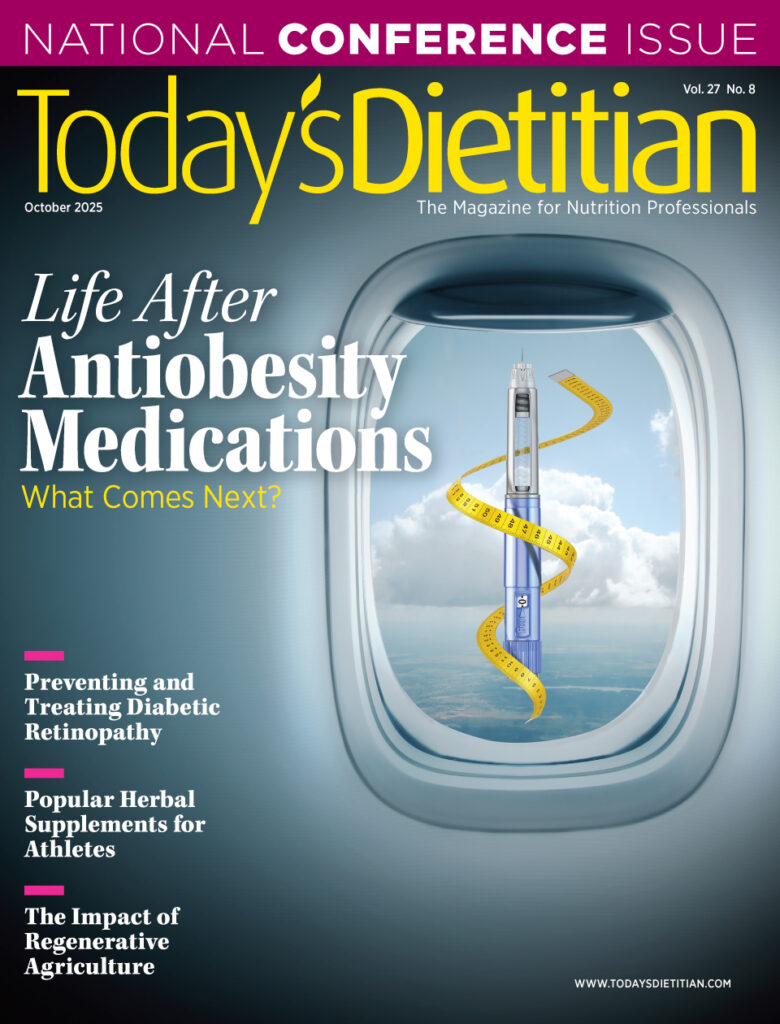Today’s Dietitian
Vol. 20, No. 4, P. 10
Q: Some of my clients have asked me whether people can be allergic to alcohol. Is there such thing as an alcohol allergy or alcohol intolerance?
A: There is, in fact, a genetic condition known as alcohol intolerance in which the body can’t break down alcohol efficiently. However, common allergens in alcohol can trigger a response as well.
The Chemistry of Alcohol Intolerance
Taylor Wallace, PhD, CFS, FACN, principal consultant and CEO at the Think Healthy Group and an affiliate professor in the department of nutrition and food studies at George Mason University, explains the mechanism of action in those with alcohol intolerance: There are two enzymes involved with the proper breakdown of alcohol including alcohol dehydrogenase (which breaks down alcohol into acetaldehyde) and acetaldehyde dehydrogenase (which breaks down acetaldehydes into acetic acid). Individuals with alcohol intolerance are more likely to produce lower levels of acetaldehyde dehydrogenase, which leads to buildup of toxic acetaldehydes in the bloodstream and causes migraines or an allergic response (eg, red flushing of the face/skin).
Asian individuals are more genetically prone to having this condition. Other symptoms of alcohol intolerance include diarrhea, hot flashes, heartburn, hives, rash, heart palpitations, low blood pressure, stuffy nose, and trouble breathing. In addition, consumption of alcohol can worsen symptoms in those with asthma.
Reaction to Common Allergens
Alcoholic beverages contain a variety of allergens that also can result in a reaction. For example, red wine may contain sulfites and egg protein, while most beer contains gluten and hops. A grain such as wheat, corn, or rye within the alcoholic beverage also can trigger a reaction if the individual has an allergy to that particular food. These reactions are similar to those previously described.
Client Recommendations
There’s no prevention for alcohol intolerance or the reactions associated with drinking alcoholic beverages that contain allergens. The best recommendation is to avoid alcohol or the specific substance within alcohol that triggers the reaction. As such, if a separate allergen is the underlying cause, then nutrition professionals should review labels with clients; however, it should be noted that not all ingredients in alcoholic beverages are listed on the label. RDs also should review guidelines for selecting alcohol. For example, if the individual has a reaction to sulfites, then organic wine made without sulfites may be an acceptable substitute. According to USDA organic wine labeling standards, any wine, foreign or domestic, can contain only naturally occurring sulfites at less than 10 ppm to be marketed and sold as “organic wine.”1
Furthermore, if a client has alcohol intolerance and wishes to drink, RDs should review the 2015–2020 USDA Dietary Guidelines’ recommendation, which is one to two drinks per day as maximum consumption for women and men, respectively. One drink is defined as 12 fl oz beer (5% alcohol by volume [ABV]), 5 fl oz wine (12% ABV), or 1.5 fl oz 80-proof distilled spirits (eg, rum, vodka).2
— Toby Amidor, MS, RD, CDN, is the founder of Toby Amidor Nutrition (http://tobyamidornutrition.com) and the author of the cookbooks The Greek Yogurt Kitchen, The Healthy Meal Prep Cookbook, and The Easy 5-Ingredient Healthy Cookbook. She’s a nutrition expert for FoodNetwork.com and a contributor to US News Eat + Run and MensFitness.com.
References
1. USDA Agricultural Marketing Service. Labeling organic wine. https://www.ams.usda.gov/sites/default/files/media/Labeling%20Organic%20Wine.pdf. Published February 2014. Accessed February 18, 2018.
2. US Department of Health & Human Services. Dietary Guidelines for Americans 2015–2020: Eighth Edition: Appendix 9. Alcohol. https://health.gov/dietaryguidelines/2015/guidelines/appendix-9/. Published January 7, 2016.


